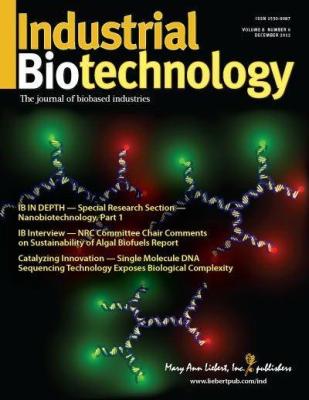Jan 29 2013
The U.S. Department of Agriculture (USDA) invests nearly $10 million a year to support about 250 nanoscale science and engineering projects that could lead to revolutionary advances in agriculture and food systems.
 Industrial Biotechnology is published six times a year in print and online (Credit: ©2013, Mary Ann Liebert, Inc., publishers)
Industrial Biotechnology is published six times a year in print and online (Credit: ©2013, Mary Ann Liebert, Inc., publishers)
Examples of current projects in development are presented in a Special Research Section published in Industrial Biotechnology, a peer-reviewed journal from Mary Ann Liebert Inc., publishers. The articles are available on the Industrial Biotechnology website.
In their introductory article, "Overview: Nanoscale Science and Engineering for Agriculture and Food Systems," Co-Guest Editors Norman Scott, PhD, Professor, Cornell University (Ithaca, NY) and Hongda Chen, PhD, National Program Leader, National Institute of Food and Agriculture, USDA (Washington, DC), describe the promising early advances nanotechnology is enabling all along the food supply chain, from production through consumption, and especially in the area of food safety.
This special issue of IB includes the review article "Bioactivity and Biomodification of Ag, ZnO, and CuO Nanoparticles with Relevance to Plant Performance in Agriculture" by Anne Anderson and coauthors, Utah State University, Logan, in which they discuss the environmental factors that affect the biological activity and potential agricultural utility of nanoparticle. In the original research article "Effect of Silver Nanoparticles on Soil Denitrification Kinetics" Allison Rick VandeVoort and Yuji Arai, Clemson University (South Carolina), describe the effects of three different silver nanoparticles on native bacteria-mediated soil denitrification.
The short communication "Soft Lithography-Based Fabrication of Biopolymer Microparticles for Nutrient Microencapsulation" by Natalia Higuita-Castro, et al., The Ohio State University and Abbott Nutrition Products Division, Columbus, OH, describes a high-throughput microfabrication method to encapsulate nutrients that can enhance food nutritional value and appearance. Dan Luo and colleagues, Cornell University, Ithaca, NY, present a promising microfluidic-based scale-up method for cell-free protein production in the methods article "Cell-Free Protein Expression from DNA-Based Hydrogel (P-Gel) Droplets for Scale-Up Production."
"The rapid expansion in nanoscale science and technology in our community with new insights and methods in biomolecular and cellular processing will spur industrial biotechnology innovation in a number of important sectors," says Larry Walker, PhD, Co-Editor-in-Chief and Professor, Biological & Environmental Engineering, Cornell University, Ithaca, NY.